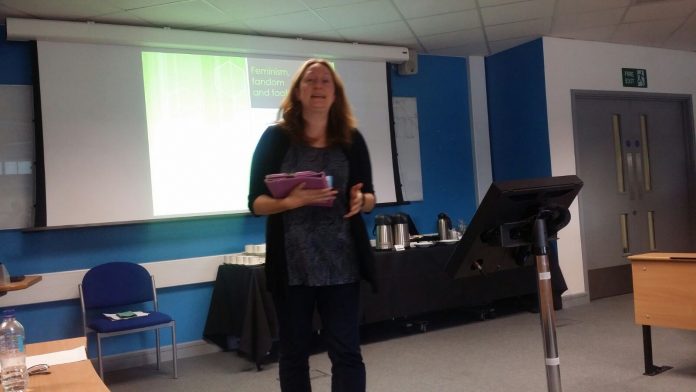Kwame Kafuor writes about Dr Carrie Dunn’s keynote speech during UEL’s inclusion week.
The University of East London joined the nation to celebrate National Inclusion week, an annual campaign to heighten awareness of the issues that exist within various societies. At UEL, inclusion week is about making sure that people feel valued, respected, listened to and able to challenge perceptions in order to achieve equality at the university.
The sport journalism department at UEL marked the occasion when the head of department, Dr Carrie Dunn delivered a keynote speech about her own experiences of sexism and the role of women in sports. These topics within sports are often considered taboo and people within the field do not want to talk about, so it was great for an up and coming sport journalist like myself, to get the chance to delve into issues like these.
There are many issues surrounding sexism in football and there are still a number of high profile people within the game that have questionable views on female coaches, officials and fans. Over recent years, some managers have been critical about the involvement of women in men’s games. Dr Dunn relived the moment she heard the then Luton manager make a sexist comment about female referees and confessed: “I was reporting on a game and felt very uncomfortable.”
Dr Carrie Dunn, was a season ticket holder at Luton Town Football Club from an early age and frequently met players to get autographs. Since overhearing those comments in 2006 Dr Dunn saw no urgency to change attitudes: “there was no desire or hunger from the club to change their attitude towards what had been said.”
‘Lack of female role models’
The role of football fans within sport has changed significantly over the last 20 years; Dr Dunn experienced this change first hand, seeing more female fans enter the men’s game. Whilst reporting from Canada at the women’sWorld Cup earlir this year, she took the opportunity to speak to female fans from England nad America. Dr Dunn found that the Amerian female fans had become interested in the game at a much eaerlier age than their English counterparts. She continued: “In the USA and Canada, football is an option within schools when they are growing up, whereas in the UK it is not an option and the standard of women’s football in the UK needs to improve.”
Dr Dunn expressed her concerns about football in the UK and the lack of female role models, she said: “The way the FA runs women’s games, lacks a lot of marketing and good funding compared to the men’s game, this means there is a lack of female role models but they have them all in the men’s game.”
The future of women’s football has been improving over the last decade with an increase in participation and audience. Dr Dunn believes that things are slowly changing for the better: “There has been increased media coverage, more role models are coming through; such as Faye White.
“More investment will help develop women’s football and create better prospects, for example going to local schools helping educate them on a career in sports journalism.”

